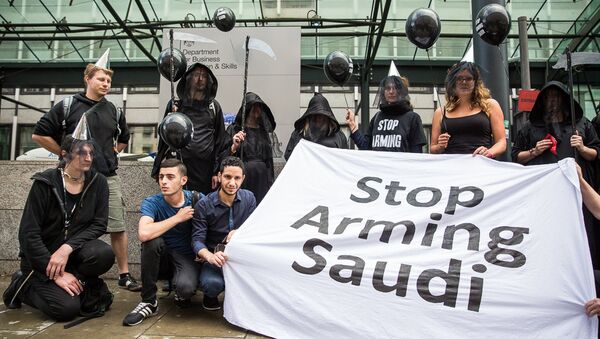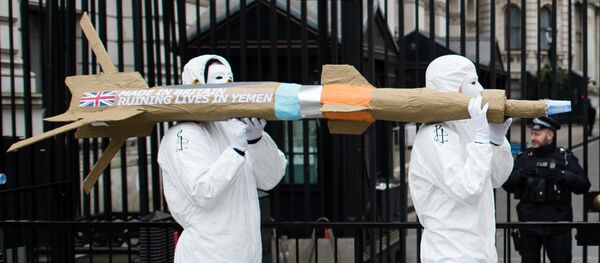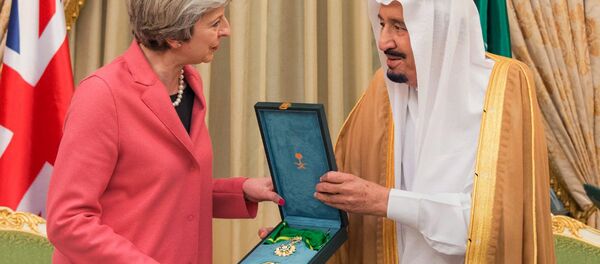The sales of the controversial technology are understood to have been made via a Danish company BAE purchased in 2011, now known as BAE Systems Applied Intelligence, according to documents obtained by the BBC.
So BAE Systems has been selling mass surveillance across the Middle East.
— Dame Alun Roberts (@ciabaudo) June 15, 2017
Just imagine that technology in the hands of Theresa May!
Buyers of the tech — named "Evident" — included Algeria, Morocco, Oman, Qatar, Saudi Arabia and the United Arab Emirates. It can be used to spy on millions of individuals' emails and mobile phones, collecting, cataloging and analyzing a vast wealth of communications data at great speed. It can also pinpoint individuals' location based on data emitted by their mobile phones — and there are even suggestions the technology is capable of breaking encrypted communications, although no clarification or details on that point have yet been specified.
"You would be able to intercept any internet traffic. If you wanted to do a whole country, go ahead. You'd probably need something to narrow your search down, either by a specific person, a specific email address, specific IP address or specific keywords to search for," a former BAE employee claimed.
Troublingly, according to leaked documents, it's clear UK officials were concerned the exports could backfire, imperiling the security of the country and their international allies. Emails dating back to 2015 between Danish and British departments responsible for overseeing exports indicate at least one official believed had the UK been asked to approve export of the technology, it would have refused on the grounds it could have been used to spy on British citizens, and even sensitive government communications.
Mainstream researchers are said to have located two Tunisians individuals employed to operate "Evident" during the now fallen dictatorship of President Zine al-Abidine Ben Ali. Under his brutal regime, opponents were arbitrarily tortured and imprisoned by his regime between 1987 and 2011, when he was overthrown in the Arab Spring.
One of the men claimed his job was to monitor Tunisia's internet from the basement of one of Ben Ali's houses. The tool, he said, is based on keywords — type in an individual's name and one is presented with every site, blog and social network connected to them.
The was part of a specialist intelligence unit that worked closely with Ben Ali, where he would be asked directly to procure information about specific people, and then forward it to the former President — most of the data related to Ben Ali's opponents.
While BAE has said it cannot comment on specific contracts due to the "strict national security and confidentiality regulations" it operates under, it disputed certain claims about the deals made in media reports — although failed to specify which ones — and claimed the company is committed to operating "ethically and responsibly."
Our interns have found the “hack” every gov’t agency is secretly excited about: https://t.co/xQjuLqx699 #GEOINT2017 pic.twitter.com/COAFHOQYRM
— BAE Systems, Inc. (@BAESystemsInc) June 7, 2017
Moreover, the company claimed its technology played "crucial" roles in enabling the UK and allies to combat international terrorism, supporting law enforcement and "helping to keep the public safe" both in the UK and abroad.
"We have robust policies and procedures in place to ensure our international exports to overseas governments are fully compliant with international export regulations as well as our own strict criteria to evaluate every potential contract," a spokesperson for the firm alleged.
Such "robust policies" are contested by Joe Lo, a Researcher at Campaign Against The Arms Trade. Moreover, he says sending such highly advanced "snooping tech" to countries such as Saudi Arabia — "well-known" for their "appalling" human rights records, is "grossly irresponsible."
"Companies like BAE and the UK government alike often claim arms sales to countries that repress people actually make world safer — disclosures like this actually make clear the exact opposite is true. Instead of reducing threats, such practices only serve and further the interests of arms manufacturers and brutal dictatorships. The UK government must end its support for the arms trade, and invest in renewable and other industries that tackle the real security concerns facing us," Lo told Sputnik.
However, there's little suggestion BAE will end its commercial relationships with the world's repressive states.
Moreover, Mr. Lo is concerned about the close links between the UK government and the arms trade.
While officials may privately express concern about BAE's conduct, the two remain almost inextricably intertwined. For instance, Kevin Taylor, BAE Systems Applied Intelligence's Managing Director, also currently serves as Chair of the government's Industrial Development Advisory board — and Brooke Hoskins, Director of BAE Systems Applied Intelligence Labs between April 2015 and July 2016, was Private Secretary to Stephen Byers, Labour Secretary of State for Business, Innovation and Skills between 1998 and 2001.






